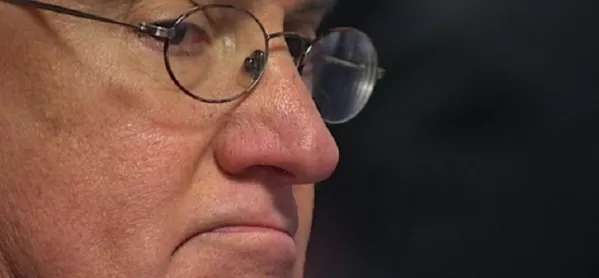
- Home
- How I felt about Wilshaw’s latest swipe at FE
How I felt about Wilshaw’s latest swipe at FE

Recently, the great former leader of Ofsted demonstrated once again that despite his impressive CV, he is utterly deluded about further education. Sigh. Why am I not surprised?
This time, Sir Michael Wilshaw has put his foot in it by ravaging students and staff at post-16 level. He started off well enough at the Schools and Academies Show. “A service which has sadly been starved of resources for 20 years” - yes, Sir Michael, we have! Always the poor relation in the education system, we are chronically under-funded, under-resourced and under-valued. Though this begs the question - what did he try to do to fix it? He was in an influential position of power, answerable to the top dogs in government. Did he even try to promote our cause? It’s all very well ranting now, but sadly, dude, you have missed your chance.
Which bit of his speech do I desecrate next?
Hmmm…let’s start with his assertion that “80 per cent of students in FE colleges fail to achieve at 18 the benchmark grade in English and maths that they should have achieved two years earlier”. Once again, it’s all about the data, never the back story. Has it never occurred to Sir Michael that not every single person in further education is going to achieve these qualifications? It is simply not realistic. Factor in learning disabilities and difficulties, social and health circumstances, an innate hatred of literacy and/or numeracy...shall I go on? I have worked with many learners who are retaking their English or maths GCSEs.
Wilshaw: Covid sent me back to teaching after 15 years
GCSE maths: 80% of teachers don’t support resit policy
News: Wilshaw says FE needs ‘big political beast’ in charge
Their attitude is generally mixed - some resent it and this drives poor attendance and attainment, some are desperate to secure the qualification but have already written themselves off and are crippled by anxiety, low self-confidence and a self-fulfilling prophecy that they “can’t do it”. I have watched some outstanding health and social care students achieve distinctions on results day, only to see they have “failed” their GCSE again.
It’s heart-breaking. These students are capable, they will be an amazing asset to the health and social care sector, and their failure is not for the want of trying. What are we expected to do differently? It is not fair to expect colleges to miraculously reverse the fortunes of all students in one or two years, when their primary and secondary schools failed to achieve it in 12 years with more resources at their disposal.
Discriminating against FE students
Sir Michael then moved on to employers and suggested that they discriminate against students who complete their further education in college, because it is seen as being less adequate than staying in a school sixth form. I’m going to defend the employers here. I have never witnessed this. None of my students who wanted to enter employment immediately upon completing their college course failed to secure a paid position. Most college courses offer extensive work experience opportunities, links with industry professionals and a practical application of classroom theory. It brings the course to life. What employer wouldn’t want that?
Finally, Sir Michael took a swipe at teachers - we knew it was coming. “Too many learners do not come out with the relevant skills for employment. Too many vocational courses are of low quality, where teaching is also at too low a level.” As per usual, offering no evidence to back this up, we are all tarnished with the same brush. Could you demoralise us any more if you tried, Sir Michael? Not to mention, of course, that for some students there is a realistic limit to what we can achieve.
A particularly unmotivated or emotionally struggling student might spend two years just trying to get to lessons on time without having a meltdown. For them, arriving punctually and staying for the full duration of a lesson might be a huge achievement. I have taught many learners who were at serious risk of dropping out of college and ending up NEET (not in education, employment or training). But I worked with them, offered endless metaphorical hugs and cups of tea, spending excessive hours at evenings and weekends tailoring support. Many of these learners made it through the course. They may not have achieved their target grade, but they have a qualification, which is for life and no one can take it away from them.
They have proven to themselves that they are capable and it boosts their self-esteem. If they left the course broken and feeling doomed to failure for the rest of their lives, would they achieve as much? What about the impact on their mental health and social connections? Sometimes the message that they can achieve and they do have something to offer is the best legacy we can provide to young people.
But, of course, if you can magic us some more money, Sir Michael, that would be great.
The author is a health and social care teacher at a sixth-form college in the East of England
Register with Tes and you can read five free articles every month, plus you'll have access to our range of award-winning newsletters.
Keep reading for just £4.90 per month
You've reached your limit of free articles this month. Subscribe for £4.90 per month for three months and get:
- Unlimited access to all Tes magazine content
- Exclusive subscriber-only stories
- Award-winning email newsletters
You've reached your limit of free articles this month. Subscribe for £4.90 per month for three months and get:
- Unlimited access to all Tes magazine content
- Exclusive subscriber-only stories
- Award-winning email newsletters



